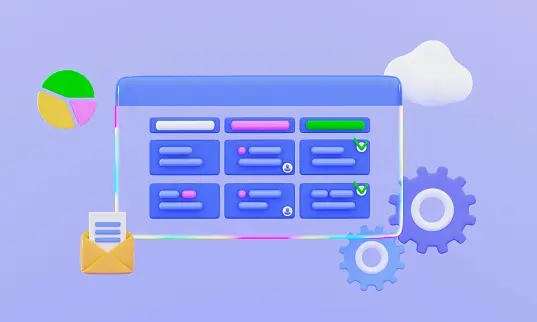As we look towards the future, the freelancing landscape is poised for significant transformation. The rapid pace of technological advancements, coupled with shifting business needs, means that certain freelancing skills will be more in demand than ever. This comprehensive guide explores the top freelancing skills that are expected to dominate the market in the coming years, providing valuable insights for both aspiring and experienced freelancers.
1. Artificial Intelligence and Machine Learning
The applications of AI and ML are vast and varied. In healthcare, they are used for predictive diagnostics and personalized medicine; in finance, for algorithmic trading and fraud detection; and in retail, for customer recommendations and inventory management. Additionally, AI and ML are integral to advancements in autonomous vehicles, natural language processing, and robotics.
Artificial Intelligence (AI) and Machine Learning (ML) are transformative technologies that are reshaping industries and revolutionizing the way we interact with the world. AI refers to the simulation of human intelligence in machines, enabling them to perform tasks that typically require human cognition, such as understanding natural language, recognizing patterns, and making decisions. ML, a subset of AI, focuses on the development of algorithms that allow computers to learn from and make predictions based on data. Through techniques like supervised learning, unsupervised learning, and reinforcement learning, ML models can identify trends, classify information, and even improve over time without explicit programming.

The rapid growth of AI and ML has also sparked ethical and societal considerations. Issues such as data privacy, algorithmic bias, and the impact on employment require careful regulation and thoughtful discussion. As AI and ML continue to evolve, they hold the promise of driving innovation, enhancing productivity, and solving complex problems, but they also demand responsible development and deployment to ensure that their benefits are equitably distributed and their risks are mitigated.
How to Start Freelancing in AI and ML:
- Develop Strong Foundations:
A solid understanding of mathematics, statistics, and programming languages (such as Python) is essential. Additionally, gaining knowledge in data science, neural networks, and deep learning will enhance your expertise. - Build a Portfolio:
Create projects that demonstrate your skills. This can include working on datasets, building predictive models, or developing chatbots. Showcase these projects on platforms like GitHub, LinkedIn, or a personal website. - Gain Certifications:
Earning certifications from recognized institutions can boost your credibility. Platforms like Coursera, edX, and Udacity offer courses on AI and ML. - Leverage Freelancing Platforms:
Join freelancing websites like Upwork, Freelancer, and Fiverr. Create a detailed profile, highlight your skills and projects, and start bidding on relevant jobs. - Network and Collaborate:
Engage with the AI and ML community through forums, social media, and conferences. Networking can lead to potential collaborations and job opportunities. - Stay Updated:
The AI and ML fields are constantly evolving. Keep up with the latest trends, research papers, and technological advancements to stay competitive.
By developing the necessary skills and leveraging online platforms, you can establish a successful freelancing career in AI and ML, providing innovative solutions to clients worldwide.
2. Cybersecurity
Cybersecurity refers to the practice of protecting systems, networks, and data from digital attacks, unauthorized access, and damage. In an increasingly interconnected world, the importance of cybersecurity cannot be overstated. With the rise of digital transformation, businesses, governments, and individuals rely heavily on technology, making them vulnerable to cyber threats. These threats can range from phishing attacks and malware to sophisticated hacks targeting sensitive information. Cybersecurity involves a combination of technologies, processes, and practices designed to safeguard information and ensure the integrity, confidentiality, and availability of data. As cyberattacks become more frequent and sophisticated, the demand for robust cybersecurity measures has never been greater.
The cybersecurity landscape is constantly evolving, with new threats emerging as technology advances. Cybercriminals employ various tactics to exploit vulnerabilities in systems, such as exploiting outdated software, using social engineering techniques, and launching distributed denial-of-service (DDoS) attacks. Additionally, the rise of the Internet of Things (IoT) has expanded the attack surface, creating more opportunities for malicious actors to infiltrate networks. The consequences of a successful cyberattack can be devastating, leading to financial losses, reputational damage, and even legal repercussions. Organizations must stay vigilant and continuously update their cybersecurity strategies to address these evolving threats and protect their assets.

To enhance cybersecurity, individuals and organizations must adopt best practices that prioritize protection and risk management. This includes implementing strong passwords, regularly updating software and systems, and using firewalls and antivirus programs. Educating employees about the importance of cybersecurity and recognizing potential threats is also crucial in preventing attacks. Moreover, organizations should establish a comprehensive incident response plan to quickly address and mitigate the impact of security breaches. As the digital landscape continues to expand, investing in advanced cybersecurity technologies such as artificial intelligence and machine learning can provide an additional layer of defense. By staying informed and proactive, individuals and organizations can better protect themselves from the ever-present threat of cyberattacks.
To start freelancing in cybersecurity, follow these steps:
- Develop Core Skills: Gain expertise in key areas such as network security, ethical hacking, incident response, and penetration testing. Obtain relevant certifications like CompTIA Security+, Certified Ethical Hacker (CEH), or Certified Information Systems Security Professional (CISSP) to validate your skills.
- Build a Strong Portfolio: Showcase your skills by working on small projects, internships, or contributing to open-source security initiatives. Create a portfolio that highlights your experience, skills, and past work.
- Choose a Niche: Specializing in a specific area, such as cloud security, malware analysis, or compliance, can help you stand out in the market. Focus on a niche that aligns with your interests and strengths.
- Set Up Your Online Presence: Create a professional website or profile on freelancing platforms like Upwork, Freelancer, or Fiverr. Include your portfolio, certifications, and a clear description of the services you offer.
- Network and Market Yourself: Attend cybersecurity conferences, webinars, and networking events to connect with potential clients. Use social media platforms like LinkedIn to share insights, join relevant groups, and showcase your expertise.
- Secure Your Own Systems: As a cybersecurity freelancer, it’s essential to protect your own systems and data. Use strong passwords, enable two-factor authentication, and employ encryption tools.
- Stay Updated: Cybersecurity is a rapidly evolving field. Continuously update your knowledge and skills by taking courses, reading industry news, and participating in online forums.
Freelancing in cybersecurity can be a rewarding career path with numerous opportunities for growth. By building a strong foundation, specializing in a niche, and effectively marketing yourself, you can carve out a successful freelance career in this dynamic field.
3. Digital Marketing
Digital marketing is a broad field encompassing various strategies and techniques to promote products and services online. It includes everything from search engine optimization (SEO) and content marketing to pay-per-click (PPC) advertising and social media management. The primary goal is to leverage digital channels to reach and engage a target audience, ultimately driving conversions and fostering brand loyalty. With the rise of the internet and mobile devices, digital marketing has become a crucial component of any business strategy, allowing companies to interact with consumers in real time and measure the effectiveness of their campaigns through analytics.
Effective digital marketing relies on a combination of strategies tailored to meet specific business goals. SEO focuses on optimizing a website’s content and structure to improve its ranking on search engine results pages, driving organic traffic. Content marketing involves creating valuable and relevant content to attract and engage potential customers. PPC advertising provides an opportunity to reach users through targeted ads on search engines and social media platforms, often with measurable ROI. Additionally, social media marketing and email campaigns are essential for building brand awareness and nurturing customer relationships, as they allow for direct communication and personalized messaging.

The future of digital marketing is shaped by rapid technological advancements and evolving consumer behaviors. Trends such as artificial intelligence, machine learning, and data analytics are revolutionizing how marketers understand and engage their audiences. AI-driven tools offer insights into customer preferences and automate tasks, while machine learning algorithms enhance ad targeting and personalization. Moreover, the growing importance of privacy and data protection is prompting businesses to adopt ethical marketing practices and comply with regulations. As digital landscapes continue to evolve, staying adaptable and innovative will be key for marketers aiming to stay ahead in a competitive environment.
Freelancing in Digital Marketing offers flexibility and diverse opportunities. Here’s how to start:
- Skill Development: Gain expertise in specific areas like SEO, content creation, or PPC. Use online courses and certifications to build your portfolio.
- Portfolio Creation: Showcase your work through a professional portfolio. Include case studies, client testimonials, and examples of successful campaigns.
- Networking and Branding: Establish an online presence through a personal website and social media profiles. Join industry forums and attend virtual networking events.
- Platforms and Bidding: Use freelancing platforms like Upwork, Fiverr, and Freelancer to find projects. Write compelling proposals and highlight your unique skills.
- Continuous Learning: Stay updated with the latest trends and tools in digital marketing. Adapt to changes in algorithms and consumer behavior.
Freelancing in digital marketing offers the freedom to work with diverse clients and projects. By honing your skills and building a strong online presence, you can establish a successful freelancing career in this dynamic field.
4. Blockchain Development

Blockchain technology is no longer limited to cryptocurrencies. Its applications span various sectors, including finance, healthcare, and supply chain management. Freelancers with skills in smart contract development, blockchain architecture, cryptocurrency integration, and decentralized application (DApp) development will find ample opportunities in this expanding field
Key Areas:
- Smart contract development
- Blockchain architecture
- Cryptocurrency integration
- Decentralized application (DApp) development
5. Cloud Computing

The adoption of cloud-based solutions is accelerating, driven by the need for scalable and efficient systems. Freelancers who can assist with cloud migration, architecture, DevOps, and security will be in high demand. Their expertise will help businesses optimize their operations and reduce costs
Key Areas:
- Cloud migration
- Cloud architecture
- DevOps
- Cloud security
6. UI/UX Design

User experience is a critical component of any digital product. Freelancers with a keen eye for design and a deep understanding of user behavior will be highly valued. Skills in wireframing, prototyping, user research, visual design, and interaction design will enable freelancers to create intuitive and engaging interfaces
Key Areas:
- Wireframing and prototyping
- User research
- Visual design
- Interaction design
7. Data Science and Analytics

Data is the new gold, and businesses are increasingly relying on data-driven decision-making. Freelancers who can analyze complex data sets, perform predictive analytics, and create data visualizations will be indispensable. Their insights will drive strategic decisions and uncover new opportunities for growth.
Key Areas:
- Data mining
- Predictive analytics
- Big data technologies
- Data visualization
8. Remote Project Management

The rise of remote work has created a demand for project managers who can effectively oversee distributed teams. Freelancers with strong organizational, communication, and leadership skills will excel in this role. Proficiency in agile and scrum methodologies, time and resource management, and risk management will be crucial for success
Key Areas:
- Agile and Scrum methodologies
- Time and resource management
- Risk management
- Remote team coordination
Conclusion
As we move into 2025, these freelancing skills will be at the forefront of the market. By honing your expertise in these areas, you can not only meet the growing demands but also position yourself as a top-tier freelancer in the industry. Stay ahead of the curve, invest in learning, and watch your freelance career thrive.
Stay tuned to Opplic for more insights on financial education, tips for freelancers, and the latest business news.